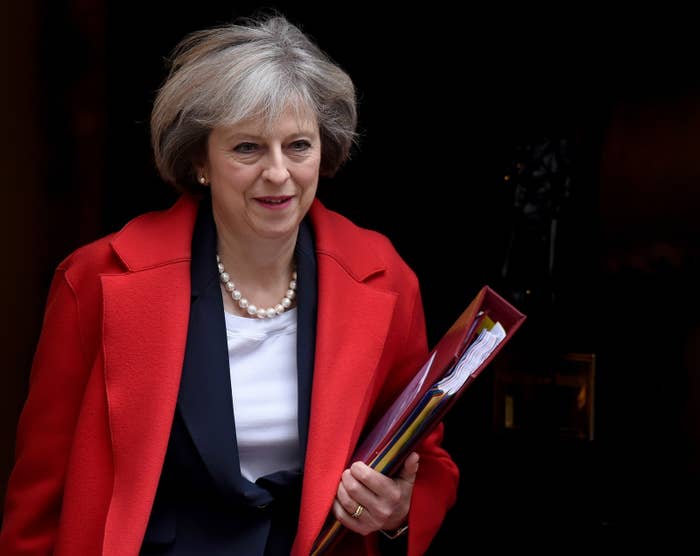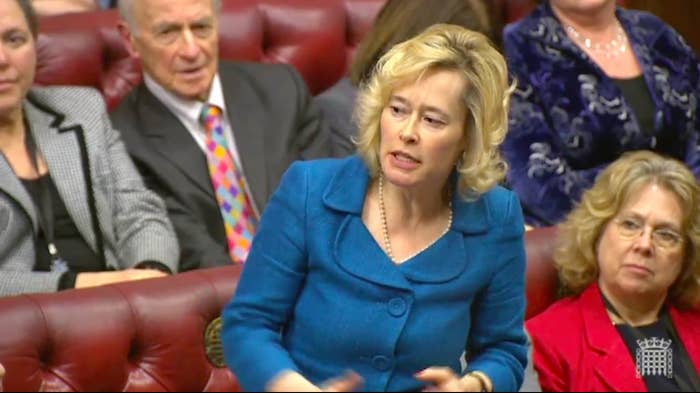
The House of Lords has voted to allow all European Union citizens currently living in the UK to remain in Britain post-Brexit, defeating Theresa May's government and potentially delaying the earliest date on which the government can trigger the process of leaving the EU.
Peers backed a Labour amendment to Brexit legislation that promises to guarantee all existing rights to legal EU residents within three months by 358 votes to 256.
Home secretary Amber Rudd, who exercised the rarely used right to sit in on the House of Lords debate, had previously warned peers that granting all EU citizens a blanket right to remain in the UK would be "one-sided guarantee" that would give away one of the UK's main bargaining chips and would "not help the situation of the hundreds of thousands of our own citizens in the EU".
The defeat means the Brexit legislation will have to go back to the House of Commons, slightly delaying the earliest possible date on which Theresa May can invoke Article 50 and begin the formal process of leaving the European Union.
Peers from all political parties and none called for EU citizens to be given the right to remain in the UK.
"Over 3 million EU citizens have come to this country in good faith," said crossbench peer Bob Kerslake. "Many have made it their home and in doing so contributed enormously to the good of this country. The only argument we have heard put forward by the home secretary in her letter for not confirming their position now is that it would weaken our hand in negotiations on EU citizens in Europe."
He said the Brussels negotiators would quickly see through this stance, since the UK economy would be hit if EU nationals left: "Our negotiating position amounts to saying 'do as we wish, or we will shoot our own foot off'. I think the EU negotiators will see through that."

Former Conservative leader and home secretary Michael Howard said: "The best way in which we can help them is to bring the uncertainty of their position to an end as quickly as possible. The best way of bringing that uncertainty to an end as quickly as possible is to pass this bill as quickly as possible and to activate Article 50 as quickly as possible."
Former Conservative minister Douglas Hogg said he doubted Theresa May would ever expel millions of EU citizens but he wanted a legal guarantee to ensure this was not possible: "I do ask our leadership to take the high moral ground and give reassurance to the millions who’ve made their home here with the expectation that they can remain here."
The Conservatives do not have a majority in the upper chamber, where Liberal Democrats and Labour politicians queued up to criticise the proposal.
Liberal Democrat peer Julie Smith said it was time to act: "We have all been receiving emails for people saying 'We are concerned about our future.'"
There were some voices in support of the government's position. The Archbishop of York said the amendment did not belong as part of this legislation, while former Conservative chancellor Nigel Lawson, who lives in France, said it was unnecessary: "The only consequence of this amendment is to stir up fear and concern among the EU residents of this country."
Former Tory minister Norman Tebbit complained that "we seem to be thinking of nothing but the rights of foreigners".
However, it is possible the proposal will be overturned by the House of Commons and the main effect of the government's defeat could be a slight delay in the Brexit timetable. The prime minister has pledged to invoke Article 50 by the end of March.
Menzies Campbell, the former Liberal Democrat leader, was at one point challenged as to how anyone could come up with a legal definition of 'legally resident' given the lack of a central database of EU citizens living in Britain.
He replied: "Just as Brexit means Brexit, legally resident means legally resident."
